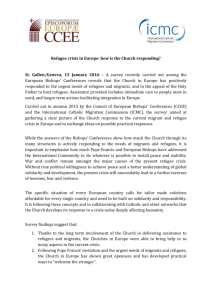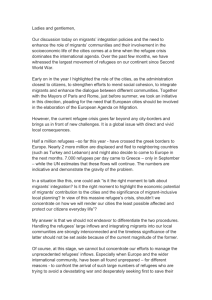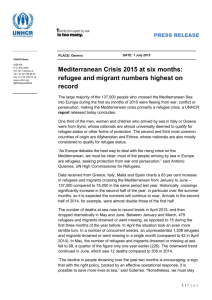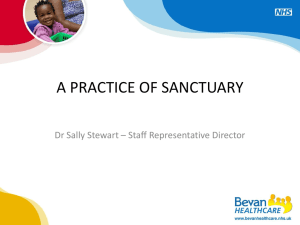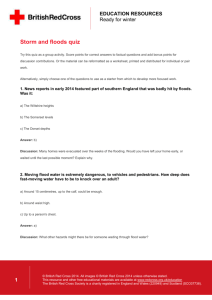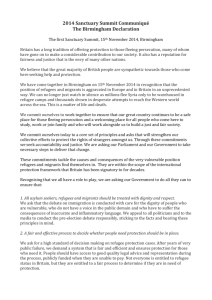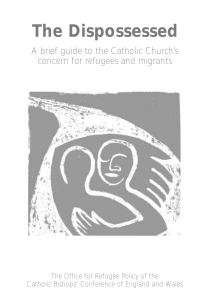Out in the cold lesson plan (docx / 1.24 MB)
advertisement
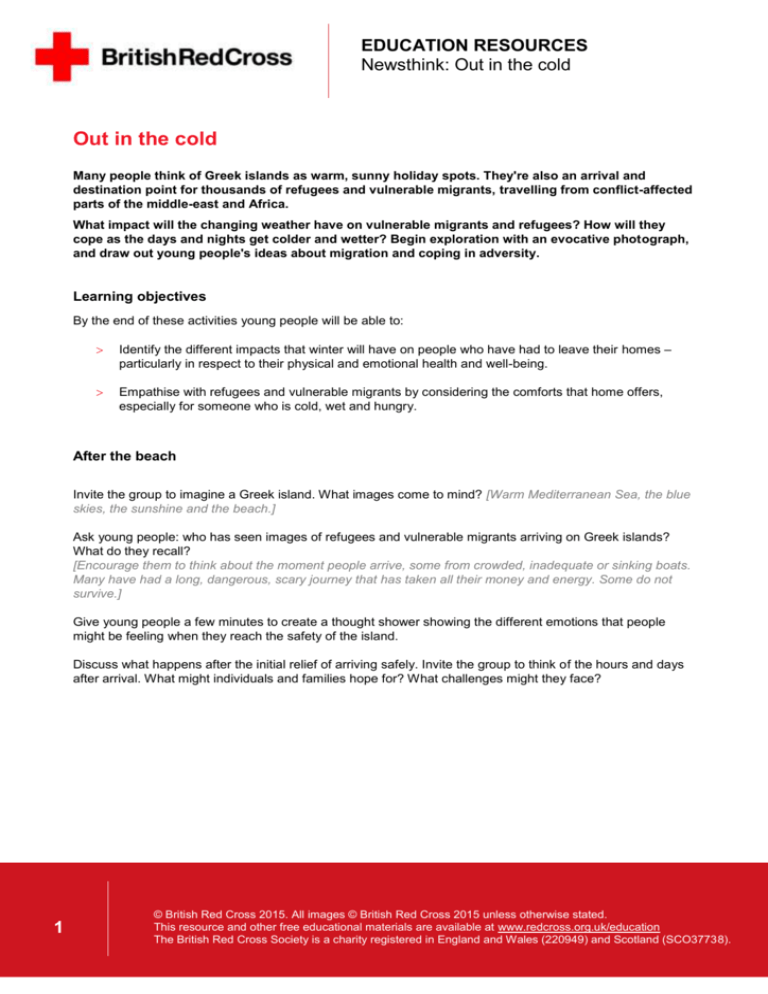
EDUCATION RESOURCES Newsthink: Out in the cold Out in the cold Many people think of Greek islands as warm, sunny holiday spots. They're also an arrival and destination point for thousands of refugees and vulnerable migrants, travelling from conflict-affected parts of the middle-east and Africa. What impact will the changing weather have on vulnerable migrants and refugees? How will they cope as the days and nights get colder and wetter? Begin exploration with an evocative photograph, and draw out young people's ideas about migration and coping in adversity. Learning objectives By the end of these activities young people will be able to: Identify the different impacts that winter will have on people who have had to leave their homes – particularly in respect to their physical and emotional health and well-being. Empathise with refugees and vulnerable migrants by considering the comforts that home offers, especially for someone who is cold, wet and hungry. After the beach Invite the group to imagine a Greek island. What images come to mind? [Warm Mediterranean Sea, the blue skies, the sunshine and the beach.] Ask young people: who has seen images of refugees and vulnerable migrants arriving on Greek islands? What do they recall? [Encourage them to think about the moment people arrive, some from crowded, inadequate or sinking boats. Many have had a long, dangerous, scary journey that has taken all their money and energy. Some do not survive.] Give young people a few minutes to create a thought shower showing the different emotions that people might be feeling when they reach the safety of the island. Discuss what happens after the initial relief of arriving safely. Invite the group to think of the hours and days after arrival. What might individuals and families hope for? What challenges might they face? 1 © British Red Cross 2015. All images © British Red Cross 2015 unless otherwise stated. This resource and other free educational materials are available at www.redcross.org.uk/education The British Red Cross Society is a charity registered in England and Wales (220949) and Scotland (SCO37738). EDUCATION RESOURCES Newsthink: Out in the cold Changing perceptions Show the photograph. Explain that the picture was taken in the town of Mytilene on the Greek island of Lesbos in late October 2015. The caption reads: "Migrants keep warm by a fire as they cope with the wet and cool weather while waiting to be processed at the increasingly overwhelmed Moria camp". Many thousands of people have to wait before they can be registered. Most are thought to be from the war zones of Syria, Iraq and Afghanistan. Invite young people's reactions to the photo. Fire can bring warmth and comfort. Staring at the flames is also a time for reflection. Ask young people: What might the young woman be reflecting on? What might be her mood as she thinks about the past, present and future? The photographer has composed the image in a way that stresses individuality. There are no groups of people. None of the six people in the frame is interacting with anyone else. They are not expressing identifiable emotion. More common images of migrants show people in groups, crowded together, sometimes hugging each other, in a state of high emotion. Ask young people: Does this image help you think more about the personal aspects of being a refugee? Can focussing on an individual’s experience change your perceptions of people in a group? If so, how? Discuss the following, with the photograph in mind: "The word refugee isn't a description of a person. It's a description of something that has happened to a person." Young people could write a poem inspired by the photograph or the quote above. Encourage them to include emotions such as joy, relief, reflection, as well as past, future and present challenges. Refer back to some of the words they noted down in their initial thought showers. They could also use metaphors about fire, heat and light. 2 © British Red Cross 2015. All images © British Red Cross 2015 unless otherwise stated. This resource and other free educational materials are available at www.redcross.org.uk/education The British Red Cross Society is a charity registered in England and Wales (220949) and Scotland (SCO37738). EDUCATION RESOURCES Newsthink: Out in the cold Home comforts When you're cold, wet, hungry and a bit scared a natural reaction is to want to go home. Why? Drill down into the detail by asking young people to list what specifically they want a home to provide. If it's helpful, invite them to choose from this list. There are nine elements so this activity could be delivered as a diamond ranking exercise. Comfort and familiar surroundings Safety - being out of danger Being warm Being dry People to sympathise Food and drink Entertainment A bath or shower Clean clothes A chance to be on your own Discuss the results. Which things do young people seem to value most about home – is it the practical, physical or emotional elements? How would they feel if they weren’t able to go home? Ask young people to think of a time when they were cold and wet. How did it make them feel? How did it make them act? A reflective writing or drawing exercise could help them draw out the different physical and emotional impacts of being cold, wet and unable to go home. Conclude by bringing the conversation back to the situation many refugees in Europe are currently facing. Can young people identify some of the different impacts that the changing weather and being far from home might have on their health and wellbeing? Steer the conversation so young people consider the varying impacts for: the young and elderly, those who are with family or friends, and those who are alone, people staying in a makeshift camp and people on the move. Staying warm European leaders have been agreeing routes through the Western Balkans for refugees and vulnerable migrants. Find the Western Balkans on a map. What are the average minimum temperatures in winter for the area? Discuss the implications, using for reference the fact that the internal temperature of fridges is meant to be 4 degrees centigrade. 3 © British Red Cross 2015. All images © British Red Cross 2015 unless otherwise stated. This resource and other free educational materials are available at www.redcross.org.uk/education The British Red Cross Society is a charity registered in England and Wales (220949) and Scotland (SCO37738). EDUCATION RESOURCES Newsthink: Out in the cold Many refugees arrive wearing shorts, T-shirts and flip-flops, which offer no protection in cooler temperatures. Hypothermia is a real concern. Humanitarian aid agencies are distributing raincoats and stocking winter relief supplies such as thermal foil blankets, thermoses, warm winter clothing and footwear. Invite young people to speak for 30 seconds on what they would personally do to keep warm if going on a journey lasting several days in winter. Extension activity: Building a snowman Many refugees experience very low temperatures in winter. Here's a photograph from two winters' ago in a makeshift refugee camp in the Bekaa Valley in Lebanon. Humanitarian aid agencies provide stockpiles of essential items, including the construction materials, blankets and mattresses visible in the background. But children just want to play in the snow. Ask young people: Does this image change your perception of people living in refugee camps? If so, how? How would you define the term ‘shared humanity’? What things do we all have in common? What makes us human? Can they identify three ‘benefits of play’ for children regardless of where they are living or the situation they are in? Credits This resource was written by PJ White of Alt62 and published in November 2015. 4 © British Red Cross 2015. All images © British Red Cross 2015 unless otherwise stated. This resource and other free educational materials are available at www.redcross.org.uk/education The British Red Cross Society is a charity registered in England and Wales (220949) and Scotland (SCO37738).

